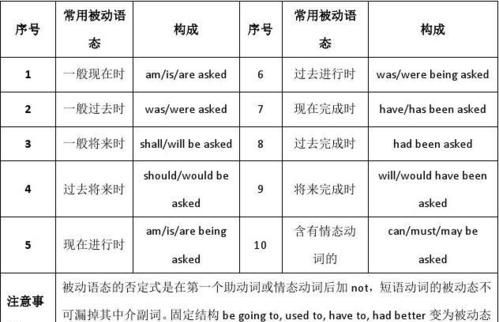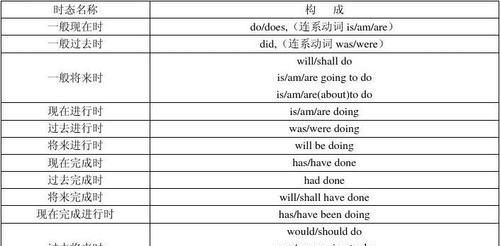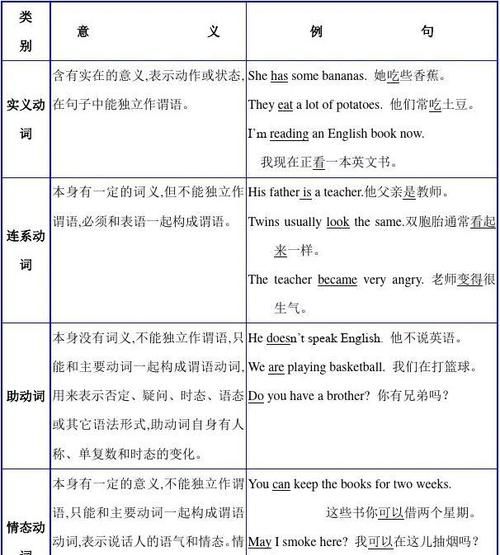本文目录
英语所有时态句子构成公式
英语共有16种时态,主要有:完成时态——现在完成时、过去完成时、将来完成时;进行时态——现在进行时、过去进行时、将来进行时、完成进行时;一般时态。
一般现在时
(1)一般现在时表示没有时限的持久存在的动作或状态或现阶段反复发生的动作或状态,常和副词 usually,often,always sometimes, regularly,near,occasionally,every year, every week 等连用。例如:
1)The moon moves round the earth..
2)Mr. Smith travels to work by bus every day.
(2)在由after,until,before,once,when,even if,in case,as long as,as soon as,the moment 以及 if,unless 等引导的时间状语从句或条件状语从句中,通常用一般现在时代替将来时。例如:
1)I will tell him the news as soon as I see him.
2)I will not go to countryside if it rains tomorrow.
3) I will have arrived by the time the meeting begins.
(3)某些表示起始的动词,可用一般现在时表示按规定、计划或安排要发生的动作,这类动词有:be,go,come,start,depart,arrive,begin,leave 等。例如:
1)The plane leaves at three sharp.
2)The new teachers arrive tomorrow.
(4)在由why,what,where,whoever,who,that,as 等引导的从句中,也常用一般现在时代替将来时。例如:
1)Free tickets will be given to whoever comes first.
2)You’ll probably be in the same train as I am tomorrow.
一般过去时
(1)表示过去某一特定时间所发生的、可完成的动作或状态,常与表示确切过去时间的词、短语或从句连用。如 yesterday, last year, in 1949, a minute ago, just now
例如:
We went to the pictures last night and saw a very interesting film.
(2)表示过去习惯性动作。例如:
1)He always went to class last.
2)I used to do my homework in the library.
(注意与be used to doing短语的区别)
3) 在since 引导的状语从句多用一般过去时.主句中一般用完成时
1)He has changed much since I saw him last.
一般将来时
1)表示将来打算进行或期待发生的动作或状态。例如:
I shall graduate next year.
2)几种替代形式:
1)be going to +v在口语中广泛使用,表示准备做或将发生的事情。例如:
I’m going to buy a house when we’ve saved enough money.
2)be to +v表示计划安排要做的事,具有“必要”的强制性意义。例如:
I am to play tennis this afternoon.
3)be about to +v表示即将发生的事情。例如:
He was about to start.
4)be due to +v表示预先确定了的事, 必定发生的事。例如:
The train is due to depart in ten minutes.
5)be on the point/verge of +v – ing 强调即将发生的某种事态。例如:
The baby was on the point of crying when her mother finally came home.
6) 有些动词用现在进行时,表示在最近按计划或安排要进行的动作,多和表示未来时间的状语连用
1) we are leaving on Friday.
现在进行时
(1)表示现在正在进行的动作,常与now,right now,at the moment,for the time being,for the present等连用。例如:
Don’t disturb her. She is reading a newspaper now.
(2)表示现阶段经常发生的动作, 常与always,continually,forever,constantly等连用。例如:
My father is forever criticizing me.
(3)表示根据计划或安排在最近要进行的事情。具有这种语法功能的动词仅限于过渡性动词。即表示从一个状态或位置转移到另一个状态或位置上去的动词。常用的有:go,come,leave,start,arrive,return等。例如:
They are leaving for Hong Kong next month.
(4)有些动词不能用进行时,这是一类表示“感觉,感情,存在,从属”等的动词。如:see,hear,smell,taste,feel,notice,look,appear,(表示感觉的词);hate,love,fear,like,want,wish,prefer,refuse,forgive(表示感情的动词);be,exist,remain,stay,obtain(表示存在状态的动词);have,possess,own,contain,belong,consist of,form(表示占有与从属的动词);understand,know,believe,doubt,forget,remember(表示思考理解的动词)。但是如果它们词义改变,便也可用进行时态。例如:
1)Tom looks pale. What’s wrong with him?
(look 在此为联系动词,意为“显得,看上去”)
2)Tom is looking for his books.
(look 在此为实义动词,意为“寻找”)
过去进行时
过去进行时表示一个过去的动作发生时或发生后,另一个过去的动作正在进行,或表示过去反复的习惯,常与always,continually,constantly等动词连用。例如:
1)We were discussing the matter when the headmaster entered.
2)Whenever I visited him, he was always writing at the desk.
将来进行时
将来进行时主要表示将来某一时刻正在进行的动作,或表示要在将来某一时刻开始,并继续下去的动作。常用来表示礼貌的询问、请求等。例如:
1)This time next day they will be sitting in the cinema.
2)What will you be doing at six tomorrow evening?
完成进行时
(现在、过去、将来)完成进行时是(现在、过去、将来)完成时的强调形式,将放在完成时态部分讲述。
现在完成时
(1)现在完成时用来表示对目前状况仍有影响的,刚刚完成的动作(常与yet,already,just连用),或者过去某一时刻发生的,持续到现在的情况(常与for,since连用)。例如:
1)I have just finished my homework.
2)Mary has been ill for three days.
(2)常与现在完成时连用的时间状语有:since, for, during, over等引导出的短语;副词already, yet, just, ever, now, before, often, lately, recently等;状语词组this week (morning, month, year), so far, up to now, many times, up to the present等。例如:
1)I haven’t been there for five years.
2)So far, she hasn’t enjoyed the summer vacation.
3)There have been a lot of changes since 1978.
(3)完成时态可用在下列结构中:
This (That) is (was) the first (second…) time +定语从句;This (That, It) is (was) the only (last) + n +定语从句;This (That, It) is (was) +形容词最高级+ n +定语从句。如果主句的谓语动词是一般现在时,从句的谓语动词通常用现在完成时;如果主句谓语动词是一般过去时,从句谓语动词通常用过去完成时。例如:
(1)This is one of the rarest questions that have ever been raised at such a meeting.
(2)There was a knock at the door. That was the second time someone had interrupted me that evening.
过去完成时
(1)表示过去某时间前已经发生的动作或情况,这个过去的时间可以用by,before等介词短语或一个时间状语从句来表示;或者表示一个动作在另一个过去动作之前已经完成。例如:
1)We had just had our breakfast when Tom came in.
2)By the end of last year they had turned out 5, 000 bicycles.
(2)动词expect, hope, mean, intend, plan, suppose, wish, want, desire等用过去完成时,表示过去的希望、预期、意图或愿望等没有实现。例如:
I had meant to take a good holiday this year, but I wasn’t able to get away.
另外两种表示“过去想做而未做的事”的表达方式是:
1)was / were + to have done sth, 例如:
We were to have come yesterday, but we couldn’t.
2)intended (expected, hope, meant, planned, supposed, wished, wanted, desired) + to have done sth, 例如:
I meant to have told you about it, but I forgot to do so.
(3)过去完成时常用于以下固定句型:
1)hardly, scarcely, barely + 过去完成时+ when + 过去时。例如:
Hardly had I got on the bus when it started to move.
2)no sooner +过去完成时+ than +过去时。例如:
No sooner had I gone out than he came to see me.
3)by (the end of ) +过去时间,主句中谓语动词用过去完成时。例如:
The experiment had been finished by 4 o’clock yesterday afternoon.
将来完成时
将来完成时表示在将来某一时刻将完成或在另一个未来的动作发生之前已经完成的动作;也可以用来表示一种猜测。常与将来完成时连用的时间状语有:by (the time / the end of ) + 表示将来时间的短语和句子;before (the end of ) + 表示将来时间的词语或句子;when, after等加上表示将来动作的句子等。例如:
1)By this time tomorrow you will have arrived in Shanghai.
2)I shall have finished this composition before 9 o’clock.
3)When we get on the railway station, the train will probably have left.
完成进行时
完成进行时是完成时的强调形式,有现在完成进行时,过去完成进行时,将来完成进行时。
(1)现在完成进行时表示过去某一时刻之前开始的动作或状态一直延续到过去某一时刻。例如:
I have been looking for my lost book for three days, but I still haven’t found it.
有少数动词如work, study, live, teach 等, 用现在完成时和现在完成进行时意思相差无几.
How long have you studied here?
How long have you been studying here?
但就大多数动词而言,在不用表示一段时间地状语的情况下,现在完成时表示动作的完成,而现在完成进行时表示动作的继续.
They have widened the road.
They have been widening the road.
(2)过去完成进行时表示过去某一时刻之前开始的动作或状态一直延续到过去某一时刻。例如:
It had been raining cats and dogs for over a week and the downpour had caused landslides in many places.
(3)将来完成进行时表示在将来某一时刻之前开始的一个动作或状态一直延续到将来某一时刻。例如:
By the time you arrive tonight, she will have been typing for hours.


英语语法公式
一般都是主+谓+宾。主语一般由代词(你我他),名词,充当。谓语一般由系动词be的各种形式充当,还有一般动词,注意不及物动词不跟宾语。宾语由名词,代词充当,注意代词用其宾格形式。祈使句一般省略主语。一般问句需要将助动词(do的各种形式,be 的各种形式)放在主与前面,然后跟主语,动词(此时用原形,助动词体现时态,)宾语。特殊疑问句都有其固定疑问词,固定句式,只需记忆。
初中英语,不应在语法方面下很多功夫,多读,多记则可

英语语法公式
英语语法公式
1 (see 、hear 、notice 、listen to 、look at (感官动词)+do ing
4 agree with sb 赞成某人
11 ask sb for sth 向某人什么
12 ask sb to do sth 询问某人某事 ask sb not to do 叫某人不要做某事
17 be /feel confident of sth /that clause +从句感觉/对什么有信心,自信 18 be + doing 表:1 现在进行时 2 将来时 20 be able to do sth 能够干什么
21 be afraid to do (of sth 恐惧,害怕……
22 be allowed to do 被允许做什么
23 be angry with sb 生某人的气
24 be angry with(at) sb for doing sth 为什么而生某人的气
29 be bad for 对什么有害 30 be busy with sth 忙于……
31 be busy doing sth 忙于做什么事
32 be careful 当心;小心
33 be different from…… 和什么不一样
34 be famous for 以……著名
35 be friendly to sb 对某人友好 36 be from = come from 来自
37 be full of 装满……的 be filled with 充满
38 be glad+to+do/从句 39 be going to + v(原) 将来时
40 be good at(+doing) = do well in 在某方面善长, 善于……
41 be good for 对什么有好处
42 be happy to do 很高兴做某事
43 be helpful to sb 对某人有好处
44 be in good health 身体健康
45 be in trouble 处于困难中
46 be interested in 对某方面感兴趣
47 be late for = come late to 迟到
48 be like 像……
49 be mad at 生某人的气
50 be made from 由……制成(制成以后看不见原材料)
51 be made of 由……制成(制成以后还看得见原材料)
52 be not sure 表不确定
53 be on a visit to 参观
54 be popular with sb 受某人欢迎
55 be quiet 安静
58 be sorry to do sth be sorry for sb
59 be sorry to hear that 60 be sorry to trouble sb
61 be strict in doing sth 严于做某事
62 be strict with sb 对某人要求严格
63 be strict with sb in sth 某方面对某人严格
64 be supposed to do 被要求干什么
65 be sure 表确定 66 be sure of doing sth 对做某事有信心
67 be sure of sth 对做某事有信心 68 be sure that sth 对做某事有信心
69 be sure to do sth一定会做某事
70 be terrified of + 名/动doing 害怕……
71 be terrified to do sth 害怕做某事
72 be the same as … 和什么一样
73 be used to doing sth 习惯做某事
74 be worth doing 值得做什么
75 be(feel) afraid to do sth 害怕做某事be afraid of sth 害怕某物 be afraid that 丛句
76 because+句子 because of +短语
77 begin to do = start to do 开始做某事 start…with…=begin…with… 以什么开始什么
79 borrow sth from sb 向……借…… lend sth to sb ( lend sb sth 借给……什么东西
80 both = the same(as) = not different(from) 表相同
81 bother 打扰 bother sb to do sth
82 by the end of 到……为止
85 catch up with sb 赶上某人
86 chat with sb 和某人闲谈 take sb to + 地点 带某人去某地
89 come up with 提出
90 communicate with sb 和某人交流
91 consider + doing 考虑做什么
93 decide to do sth 决定做某事 94 do a survey of 做某方面的调查
95 do better in 在……方面做得更好
97 Don't forget to do sth 不要忘了做某事
98 Don't mind +doing /从句 /名词 不要介意……
99 each +名(单)每一个…
100 end up +doing
101 enjoy +doing喜欢
102 escape from 从……逃跑
103 expect to do sth 期待做某事
105 fall in love with sb /sth 爱上什么
107 find +it +adj +to do 发现做某事怎么样
108 find sb/sth +adj 发现什么怎么样
109 finish 完成+doing(名词)
110 fit to sb = be fit for sb 适合某人
112 from…to… 从某某到某某
113 get /have sth down 做完,被(别人)做…
114 get a part-time job= find a part-time job
115 get along well with sb = get on well with sb 与某人相处得好
116 get along with sb = get on with sb 与某人相处
119 get sb to do sth
120 get…from… 从某处得到某物
122 give sth to sb give sb sth 给某人某物
124 go on to do 去做下一件事 go on doing 继续做这件事
125 go out away from go out of
131 have been doing 现在完成进行时
132 have been to …( 地方)……去过某过地方
have gone to …(地方) 去了某地还没回来
133 have fun +doing 玩得高兴
134 have sth to do 有什么事要做
135 have to do sth 必须做某事
136 have trouble (problem) (in) doing sth 做什么事情有麻烦
137 have…time +doing
139 hear sb +do/doing 听见某人做某事/正在做某事
140 help a lot 很大用处
141 help sb with sth \one's sth 帮助某人某事(某方面)
help sb (to) do sth 帮助某人做某事
142 hope to do sth 希望做某事
143 How about(+doing) = What about(+doing)
154 introduce sb to sb 介绍某人给某人 introduce oneself 自我介绍
155 invite sb to do sth 邀请某人做某事
156 It takes sb sometime to do sth 做某人花掉某人多少时间
157 It's +adj +for sb to do sth 对某人来说做某事怎么样
158 It's +adj +to do 做某事怎么样
159 It's +adj for sb 对于某人来说怎么样 It's +adj of sb 对某人来说太怎么样
160 It's +adj(for sb) to do(对某人来说) 做某事怎么样
It's +adj of sb to do sth 对某人来说做某事太怎么样
161 It's a good idea for sb to do sth 对…… 来说是个好主意
162 It's important to sb 对某人来说很重要
163 It's time to do sth It's time for sth 到了该去做某事的时间
166 keep +sb /sth +adj /介词短语 让什么保持什么样?
173 learn from sb 向某人学习
174 learn to do sth 学做某事
175 let sb do sth 让某人做某事
176 Let sb down 让某人失望
177 live from :离某地远
178 live in +大地方 /at +小地方 居住在某地
179 look after = take care of 照顾 照看
181 make a decision to do sth 决定做某事
182 make friends with sb 和谁成为朋友
183 make it early 把时间定的早一点
184 make on exhibition of oneself 让某人出洋相
185 make sb /n +n 使什么成为什么
186 make sb /sth +adj 使某人(某物)怎么样
187 make sb /sth adj 使某人/某物怎么样 188 make sb do sth 让某人做某事
189 make up be made up of (被动语态)由……组成
191 mind sb to do mind one's doing 介意……做什么
192 most +名 most of +代
193 much too +形容词
194 must be 一定 195 need +名词
196 need sb do sth 需要某人做某事
197 need to do (实义动词) need do (情态动词)
198 no /neithr of hate to do no /neithr of hate doing
199 no +名词
202 not…at all 一点都不
204 not…until 直到……才……
205 offer / provide sb with sth 给某人提供
206 offer sb sth ( offer sth to sb 提供什么东西给某人
207 on one's way to… 在谁去那的路上
208 on the one hand 一方面 on the other hand 另一方面
209 on the phOne= over the phone 用电话交谈
210 on time 准时 in time 及时
212 one of +可数名词的复数形式
213 one to another 一个到另一个
214 over and over agin 一遍又一遍的
215 part-time job 兼职工作 fall-time job 全职工作
216 pay for… 付……钱 pay the bill 开钱 ,付钱 217 please +do
219 pleased with sb
220 pool into = pore into
221 practice +doing 练习做某事
222 prefer sth to sth 相对……更喜欢……
prefer doing to sth 更喜欢去做…不愿意去做…
prefer to do sth rather than do sth 宁愿做…也不愿 prefer sb not to do sth 更愿意…
223 pretend to do sth 装着去做什么 pretend that 从句
224 rather…than 宁可……也不…… 225 regard…as 把……当作……
226 remid sb about sth 提醒某人什么事
remid sb to do sth 提醒某人做某事
227 remid sb of sth 使某人想起什么
228 return sth to sb 还什么东西给某人
231 sb spend somemoney on sth 花了多少钱在某事上
232 sb spend sometime with sb 花了多少时间陪谁
233 sb spend sometime(in) doing sth 花了多少时间做某事
234 sb with sb +is sb and sb +are
235 see sb do 看见某人做过某事
see sb doing 看见某人正在做某事
236 seem to do/be +adj 显得怎么样
237 send +sb sth 送给某人某物
238 send…to…把什么寄到哪里去?
239 shock 使……震惊
240 show sb sth 向某人展示某物
241 show sb sth = show sth to sb 拿什么东西给某人看
242 show sth to sb 向某人展示某物
245 stay away from 远离……
246 stop doing 停下正在做的事
247 stop sb from doing sth 阻止某人做某事
248 stop sb(from) doing 阻止某人做某事
249 stop to do 停下正在做的事去做下一件事
250 such +名 这样 ,这种
251 suit sb 适合某人
252 surprise sb 使某人惊奇 to one's surprise 令某人惊奇
253 take classes 上课
254 take sb to 把某人带去
257 talk with sb 和某人说话
258 teach sb sth 教某人做某事
259 tell sb do sth 告诉某人做某事
261 tell sb sth 告诉某人某事
262 tell sb to do sth 告诉某人做什么
tell sb not to do sth 告诉某人不要做什么
264 thank you for +doing
265 the same +名词(doing)+as……
267 the way to do sth = the way of doing st做某方面 的方法
the way to +地方 去哪的路
268 the way to…(地点) 到哪的
269 too…to… 太怎样而不能……adj +enough to 足够…能… so…that +丛句
270 transalte ……into…… 把什么翻译成什么
271 travel with sb和某人去旅游
272 try one's best to do sth尽某人最大的努力去做某事
273 try to do sth 想干什么,但没成功
try doing sth 想干什么,已经做过了
274 try…试衣服 have a try 试一下
275 turn down/up 开小/开大
276 turn off/ on 关上/打开 open 拆开
277 upside down 倒着
278 visit to… 参观某个地方
279 wait for sb 等某人
【来自百度文库】

以上就是关于英语6种语法的公式 ,英语所有时态句子构成公式的全部内容,以及英语16种语法的公式 的相关内容,希望能够帮到您。

